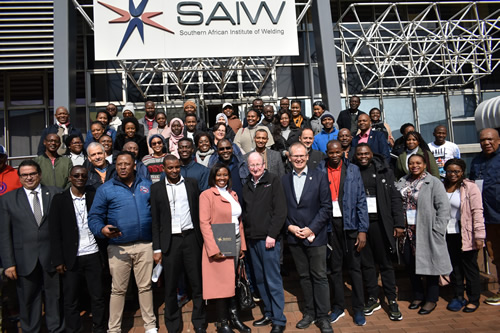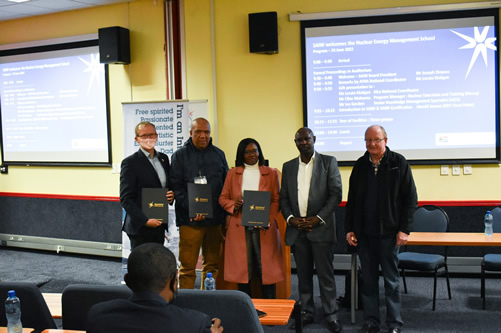SAIW champions Africa School of Nuclear Power Excellence

The Southern African Institute of Welding (SAIW) is championing the formation of an Africa School of Nuclear Excellence in co-operation with the Nuclear Energy Corporation of South Africa (NECSA). As part of this drive, the SAIW hosted a delegation of approximately 60 delegates for the launch of this year’s Nuclear Energy Management Schools (NEMS) programme (NEMS2022).
The proposed school will focus on practical welding, welding inspection and technology, technical services and non-destructive testing in the field of exotic materials or configurations used in the design, construction, commissioning, in-service inspection, maintenance, refurbishment and decommissioning cycle of nuclear plants.
SAIW NDT Manager Harold Jansen reports; “Nuclear energy is an important part of Africa’s economic development as it provides large amounts of virtually carbon-free baseload power at stable variable costs. This has the potential to contribute significantly to both the economic and environmental goals. Non-destructive testing offers reliable and accurate results which can provide stability. Since this testing method does not damage the components, all pieces of equipment and machinery can be tested which can minimize the inaccuracy of test results and any undermined irregularities. This is important for the nuclear programme.”
In support of this, the SAIW has already been responsible for the direct training of more than 160 NDT personnel in four methods up to Level 3 from more than 17 English speaking countries in Africa.
Non-destructive testing vital to nuclear

These initiatives are in line with broader initiatives as International Atomic Energy Agency (IAEA) seeks to promote industrial applications which focus on radiography testing and related methods, to assure the safety and reliability of the operation of industrial facilities and processes. The agency views NDT technology as vital to the improvement of the quality of industrial products, and the safe performance of equipment and plants, including the safety of metallic and concrete structures and constructions.
The SAIW is the Regional Designated Centre responsible for NDT and has been involved with the International Atomic Energy Agency (IAEA) since 2000 as part of the African Regional Cooperative Agreement for Research, Development and Training related to Nuclear Science and Technology (AFRA).
AFRA National Coordinator, Lerato Makgae explains; “Managerial and technical competencies are necessary to support national nuclear energy strategies and implementations across the continent. The IAEA has therefore organised NEMS with various partners since 2010, with these being established regionally in cooperation with local training institutes such as the SAIW and nuclear organisations acting as hosts.
“The NEMS programme focuses on the managerial and technical competencies that are required to support national nuclear energy strategies. It is particularly appropriate for young professionals in the member states that plan to develop or are in the process of embarking on a nuclear development programme.”
Continental collaboration

The recent NEMS2022 launch at the SAIW saw participants from 12 countries on the continent, along with IAEA Staff Members from Vienna in Austria. Countries represented included Algeria, Egypt, Ethiopia, Ghana, Kenya, Morocco, Niger, Rwanda, Senegal, Sudan, Uganda and Zambia.
Participants undertook a site visit to the SAIW to understand the NDT techniques that are used for nuclear science and technology in many industries. The visitors were taken to different facilities within the SAIW complex including practical welding, welding technology, welding inspection and NDT and viewed demonstrations presented in the various laboratories and classrooms.
Looking ahead, the SAIW’s Jansen says; “Delegates at the NEMS programme launch agreed that now is the perfect time to initiate a nuclear school of excellence utilising key NDT techniques, due to numerous factors such as the current South African energy crisis, the decreasing/ageing pool of nuclear professionals and new nuclear projects being developed on the African continent. Based on the interest shown at the NEMS2022 event, there may be even closer cooperation between the Institute and other AFRA member states and we were encouraged by the promising discussions,” he concludes.


